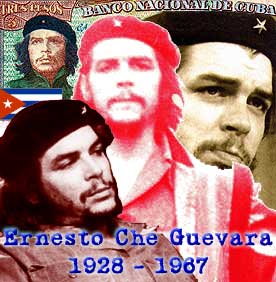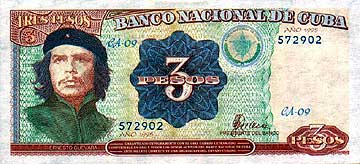
| MAIN BIOGRAPHIES |
|
Nelson Algren |
|
Neal Cassady |
|
Raymond Chandler |
|
Edward Dahlberg |
|
William Browning Spencer |
|
Olaf Stapledon |
|
Alan Turing |
|
Emiliano Zapata |
|
|

Ernesto 'Che' Guevara (1928 - 1967)
Guerrilla Warrior
National Hero of Cuba
Biographical Notes
'Che' Guevarawas born Ernesto Guevara de la Serna on 14 June 1928 in Rosario, Argentina, into a relatively upper-middle classfamily. His father was a construction engineer. He was the first offive children.
Develops a severe asthmatic condition at the age of two, prompting his family to move to the drier climate of Alta Gracia, Cordoba.
Most of his early education was provided by his mother at home. He is reported to have read widely and deeply from his father's library, encountering Marxand Freudin his early teens.
In 1941, he attends the Colegio Nacional Dean Funes, a secondary school in Cordoba.
Enrolled in the University of Buenos Aires in 1948, studies medicine, becomes interested in leprosy. His asthma disqualifies him for militaryservice.
Makes a 4,000 mile long journey through Northern Argentina alone on a moped, encountering many indigenous tribes and experiencing first handthe impoverished conditions of their lives.
In 1951, he takes off on a motorcycle journey with his good friend, Alberto Granado. They travel from Buenos Aires, down the coast of Argentina, through the Andes into Chile, and then north into Peru, Columbiaand Venezuela. The diary Che kept during this time has been published as:
The Motorcycle Diaries: A Journey Around South America.
He qualifies as a doctor in 1953, specializing in dermatology. Around this time he was exposed to the attempted worker reforms following theNational Revolution of 1952 in Boliva.
Walks and hitchhikes to Guatemala, witnesses the overthrow of the radical socialistgovernment of Jacobo Arbenz by USA-supported Castillo Armas. He could not help but note the vital role that the CIAplayed in the counter-revolution. Establishes connections with Peruvian Apristas and other Latin American radicals.
In September of 1954, he moves to Mexico City, finding work in the General Hospital. Through Hilda Gadea, a Peruvian Marxist, he meets Fidel Castro and involves himself in the planned invasion of Cuba . He marries Gadea.They have a daughter, Hildita.
Under the influence of Castro, Alberto Bayo and the writings of Mao Tse-tung, he begins to form the primary axioms of his philosophy of guerrilla warfare. In this time he also began to be called 'Che', for his habit of ending his sentences and calling his friends 'Che'- which is an Argentinian expression for buddy.
In 1956, the revolutionaries land in Cuba on the "yacht" Granma, initating a three-year guerrilla war against the dictator, Fulgencio Batista. Che is included at first for his medical expertise but soon rises through the ranks to become the Commandante of the RevolutionaryArmy of Barbutos. In this role, he is directly responsible for dozens of executions of defectors and Batista loyalists.
The revolutionaries succeed in overthrowing the Batista regime in January of 1959. Che is now considered second only to Castro, who appoints him Governor of the National Bank.

He marries Aleida March de la Torre, with whom he eventually has four children.
He is made Minister for Industry in 1961, becomes increasingly hostiletowards US interests in the Cuban economy, strengthens relationship with USSR. During the Cuban Missile Crisis, Che advocates nuclear confrontation.
From 1961 to 1965, he travels with his wife around the world as an ambassador for Cuba.
Becomes disillusioned with Soviet Communism, makes a formal break in aspeech delivered in February of 1965. Calls for guerrilla-type revolutionary actions in Africa, Asia and South America.
Che goes underground, traveling through Africa, eventually assembling a group of Cubans to fight in the Kinshasa rebellion in the Congo. Therebellion fails and Che withdraws in August of 1965.
Castro informally removes Guevara from office, their ideas for the futureof Cuba having radically diverged.
He disguises himself as Uraguayan economist, shaving off his beard and not wearing his famous beret, in order to travel incognito through Latin America.
In November 1966, he leads a group of guerrillas through southeastern Bolivia, hoping to inspire the peasants and workers into a revolutionarymovement that would spread all throughout Latin America, sparking off "twenty new Vietnams". Dispirited by casualties, illness and depression, the ragged group is cornered by a Bolivian battalion (which had been trained by US Special Forces in anti-guerrilla warfare) in a gorge on October 8. Two jets and a helicopter provide air support. Che is takento the nearby town of La Higuera.
He refuses all attempts at interrogation by CIA and Bolivan officials.The Bolivian president, General Rene Barrientos, orders the execution of Guevara as soon as possible.
9 October 1967. After a few false starts and Che's telling them to get it over with,six or more shots are fired into Guevara's torso. One version of hisreported last words were: "I knew you were going to shoot me; I shouldnever have been taken alive. Tell Fidel that this failure does notmean the end of the revolution, that it will triumph elsewhere. TellAleida to forget this, remarry and be happy, and keep the childrenstudying. Ask the soldiers to aim well." Others have claimed his lastwords to have been: "Shoot, coward! You are going to kill a man."
After his death, a death mask was made and his hands were cut off to ensure identification. His body was buried in a secret grave. Guevara was 39 years old.
In June of 1997, a team of Cuban and Argentinian scientists recovered the skeleton, missing both hands, of Guevara in the town of Vallegrande,Bolivia. The bones have since been "repatriated" to Cuba.
Quotes
-
"It is better to die standing than to live on your knees."
-
"The question is one of fighting the causes and not just the effects.This revolution is bound to fail if it doesn't succeed in reaching deep inside them, stirring them right down to the bone, and giving them back their stature as human beings. Otherwise, what's the use?"
-
"Hatred is an element of struggle; relentless hatred of the enemy thatimpels us over and beyond the natural limitations of man and transforms usinto effective, violent, selective, and cold killing machines. Our soldiersmust be thus; a people without hatred cannot vanquish a brutal enemy."
-
"Man really attains the state of complete humanity when he produces, without being forced by physical need to sell himself as a commodity."
Subcultural Relevance
The 30 year anniversary of Guevara's death, the publication of a slew of books, and the timely recovery of his bones have amply served to underscorethe recent surge in the popularity of the sixties guerrilla leader. The famous photograph of Che in black beret taken by Korda has become an icon all over the world. His image is used by everyone from politically subversiverock bands to advertisers seeking credibility. In Cuba and many parts of Latin America, he is spoken of in an almost Christ-like reverence. The Cuban government actively cultivates a "Che mythos", exploiting the nostalgia for the good old revolutionary days.
The issue of Che Guevara's relevance is two-fold. Primarily, his liferepresents the archetype of revolutionary in the late 20th centurypolitical theater. On the other hand, the blatant and nothing lessthan pornographic whoring of his image vividly illustrates the dangersof mediated manipulation and recontextualization of a threateningpersonality. It would be a sad, but telling, fate if Che ended up onlybeing remembered as fashionable martyr-rebel icon for MadsionAvenue. The imperative here is to not become seduced by the advertizedimages and empty slogans; but to see through it into the complexitiesand, at times, difficult aspects of the extraordinary human being thatwas Che Guevara.
Other Links
-
Che Guevara PageAn excellent Guevara Page, including:
-
http://www.marxists.org/archive/guevara/index.htmnice summary, with some original national security archive information.
-
LatinoLink: 'Ernesto (Che) Guevara': Revolutionary's Last DaysAn important resource with several articles addressing the contemporary influence of Guevara
-
Ernesto Che GuevaraA page by a political science major
-
VallegrandeExtremely informative site about the recovery of Guevara's remains
-
Che GuevaraBiographical sketch from the often copied, occasionally altered, Guevara entry in Edward Hyams's A Dictionary of Modern Revolution
-
CubaWebScattered information about Che from the "official Cuban Website"
-
Che Guevara's Dubious LegacyIntriguing article about Guevara's Message to the Tricontinental, which advocated hatred as an essential element of revolutionary struggle.
Major Works
-
The Bolivian Diary of Ernesto Che Guevara- Mary-Alice Waters, (ed.), Pathfinder Press, 1994
-
Che Guevara Reader: Writings on Guerilla Strategy, Politics & Revolution
-
Che Guevara Speaks: Selected Speeches & Writings
-
Episodes of the Cuban Revolutionary War 1956-58
-
Guerrilla Warfare: An Introduction
-
Motorcycle Diaries: A Journey Around South America
-
Socialism and Man in Cuba
-
To Speak the Truth: Why Washington's 'Cold War' Against Cuba Doesn't Endwith Fidel Castro, Pathfinder Press, 1992
-
Che In Africa: Che Guevara's Congo Diary[1999]
-
The Diary of Che Guevara: The Secret Papers of a Revolutionary
-
Reminiscences of the Cuban Revolutionary War
-
The Complete Bolivian Diaries of Che Guevara, and Other Captured Documents[June 2000]
Biographical and Related Secondary Texts
-
Chasing Che: A Motorcycle Journey in Search of the Guevara Legend- Patrick Symmes [2/2000]
-
I, Che Guevara- John Blackthorn (novel)
-
Che: Ernesto Guevara, Una Leyenda De Nuestro Siglo- Pierre Kalfon
-
Che: The Photobiography of Che Guevara- Christophe Loviny
-
Che For Beginners (Readers and Writers Documentary Comic Book)
-
Che Guevara- David Sandison (lots of photos)
-
Che Guevara (Pocket Biographies Series)- Andrew Sinclair
-
Che Guevara: A Biographyby Daniel James, Stein & Day Publishers
-
Che Guevara: A Revolutionary Lifeby Jon Lee Anderson, Grove Press, 1997
-
Che Guevara and the Fight for Socialism Today: Cuba Confronts the World Crisis of the '90s- Mary-Alice Waters
-
Che Guevara and the FBIedited by Michael Ratner and Michael Steven Smith
-
Che Guevara: Economics and Politics in the Transition to Socialism
-
Death of Che Guevara: A Novel- Jay Cantor, Random House
-
The Defeat of Che Guevara: Military Response to Guerilla Challenge in Bolivia- Gary Prado Salmon
-
The Fall of Che Guevara: A Story of Soldiers, Spies & Diplomats- Henry Butterfield Ryan
-
Guevara, Also Known As Cheby Paco Ignacio Taibo, St Martins, 1997
-
Compañero: The Life and Death of Che Guevara- Jorge G. Castaneda
-
Great Rebel: Che Guevara in Bolivia- Luis Gonzalez, Grove Press
-
Roll Over Che Guevara: Travels of a Radical- Marc Cooper, Norton, 1996
-
The Marxism of Che Guevara: Philosophy, Economics and Revolutionary Warfare- Michael Lowy
-
Death of a Revolutionary: Che Guevara's Last Mission (revised edition)- Richard Harris (8/2000)
-
Fat Capitalist's Song On the Death of Che Guevara
Video, Documentary and Otherwise
-
Che Guevara: Restless Revolutionary[VHS]
-
El Che: Investigating a Legend(1998) [VHS]
-
Ernesto Che Guevara, The Bolivian DiaryRichard Dindo, dir. (1994) [VHS]
-
Che!Richard Fleischer (1969) Starring Omar Sharif as Che, Jack Palance as Fidel Castro... reputed to be awful.
Author: Bonesy Jones